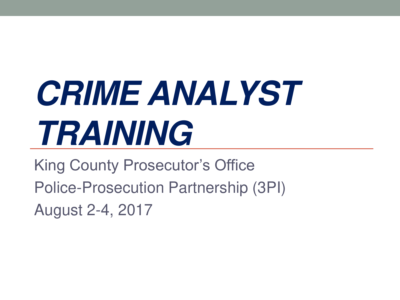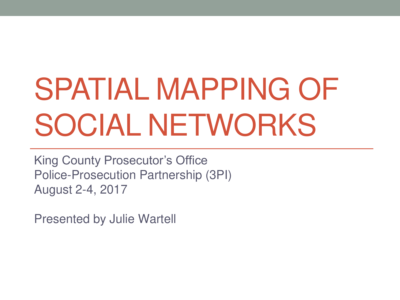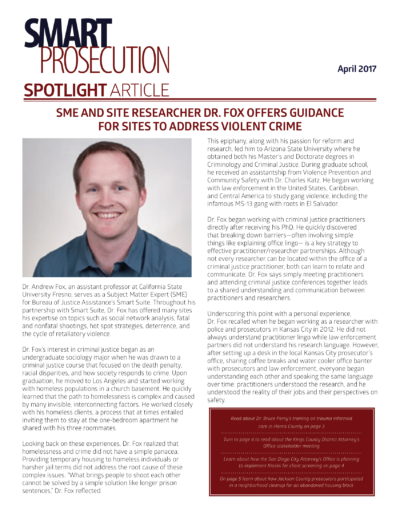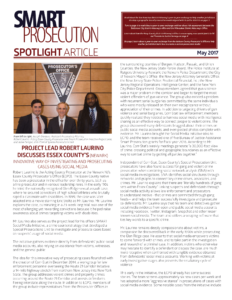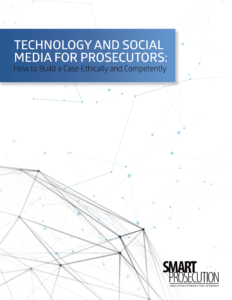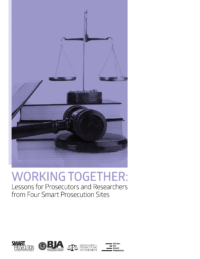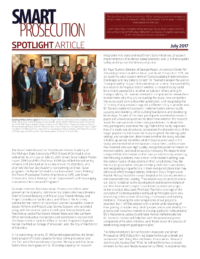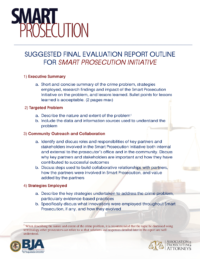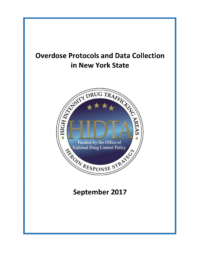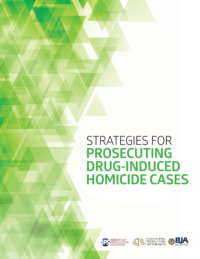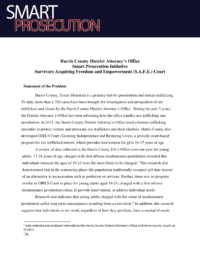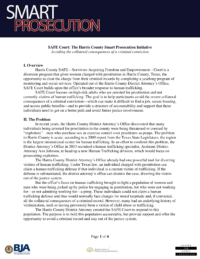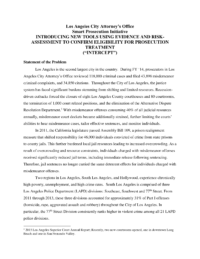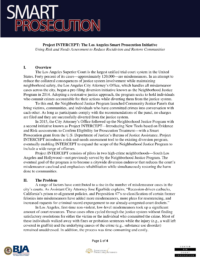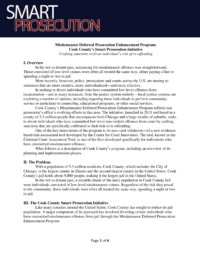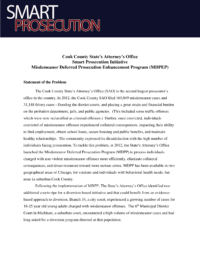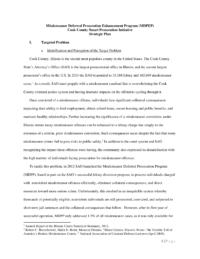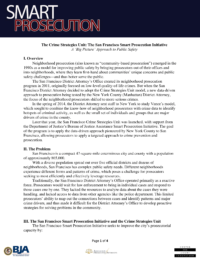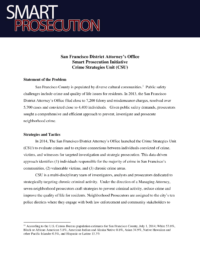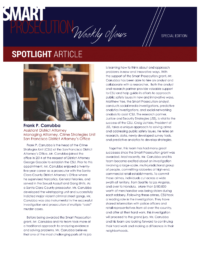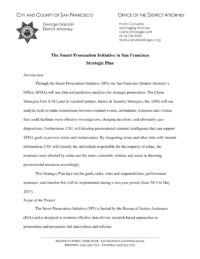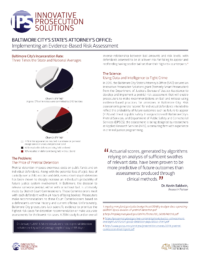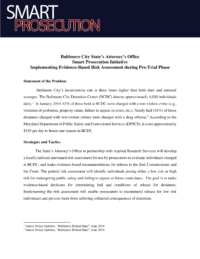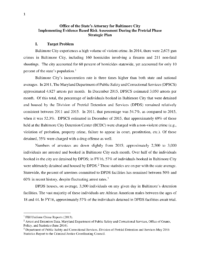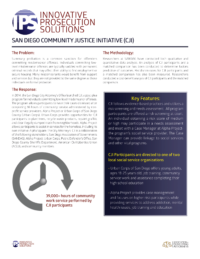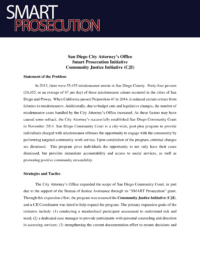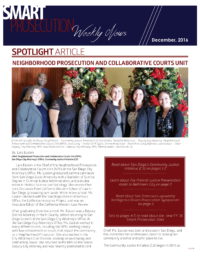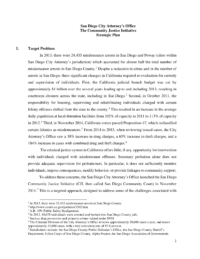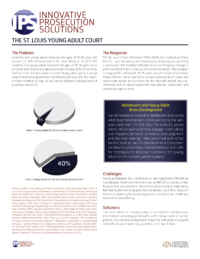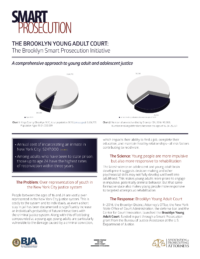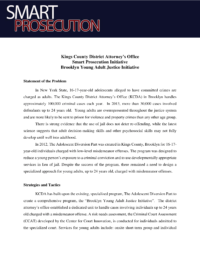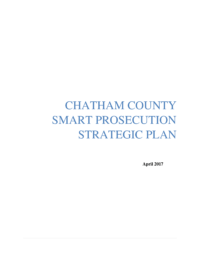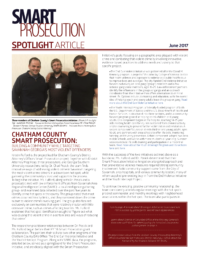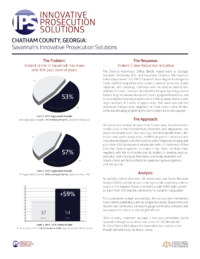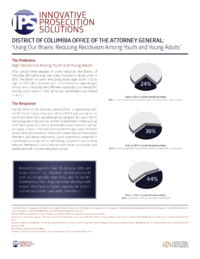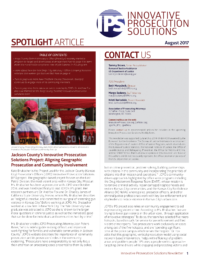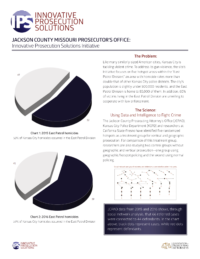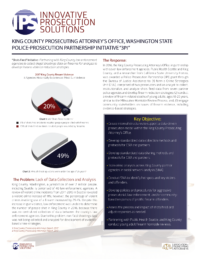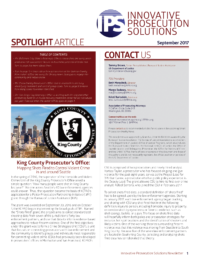
APA was the training and technical assistance (TTA) provider for the Smart Prosecution Project from October 2014 until March 2018. The Smart Prosecution Project was a program funded by the Bureau of Justice Assistance (BJA). The focus of the program was to assist prosecutor-led grantees with successfully developing, implementing, and sustaining their own federally-funded crime-solving initiatives. Prosecutor-led grantees engaged in a partnership with researchers to effectively plan and execute their data-driven initiative. With the assistance of Smart Prosecution grantees and their partners, APA developed a wide range of materials to assist the field, including webinars, fact sheets, and monographs.
Below are topic-based resources:
Resources
Crime Analysis
Social Media
Working with a Research Partner
BJA’s Center for Research Partnerships and Program Evaluation
BJA’s “Smart Suite” of programs re-examines every aspect of the criminal justice system to identify what is working in the field to reduce crime and recidivism and make our communities safer.
Program Sustainment
Strategies for Prosecuting Drug-Induced Homicide Cases
Site-Specific Resources
FY ’14 Sites
 The Harris County District Attorney’s Office has established S.A.F.E. Court, designed upon a therapeutic –based model utilizing supervised, targeted intervention and treatment for young adults between the ages of 17 and 25 years old, engaged in sex work and charged with misdemeanor prostitution. Individuals admitted into this pre-trial program for a twelve month probationary period will progress through a system of four phases during which they are expected to engage with judges, court officers, probation, prosecutors, defense attorneys and treatment providers. The goal is for individuals to be in treatment within 45 days of arrest. Services may include individual/group counseling, residential treatment, substance abuse testing, educational/vocational training and housing assistance. The research partner is developing measurable goals for the program and conducting a process and outcome assessment.
The Harris County District Attorney’s Office has established S.A.F.E. Court, designed upon a therapeutic –based model utilizing supervised, targeted intervention and treatment for young adults between the ages of 17 and 25 years old, engaged in sex work and charged with misdemeanor prostitution. Individuals admitted into this pre-trial program for a twelve month probationary period will progress through a system of four phases during which they are expected to engage with judges, court officers, probation, prosecutors, defense attorneys and treatment providers. The goal is for individuals to be in treatment within 45 days of arrest. Services may include individual/group counseling, residential treatment, substance abuse testing, educational/vocational training and housing assistance. The research partner is developing measurable goals for the program and conducting a process and outcome assessment.
 The Los Angeles City Attorney is developing and implementing INTERCEPT, a program utilizing intensive crime analysis and evidence-based assessments to evaluate prosecutorial diversion strategies for specific misdemeanor offenders issued a citation in lieu of arrest. Utilizing a risk/needs assessment tool, offenders identified as low-risk for recidivism, will qualify for non-traditional case processing. Once an offender agrees to participate in the program, the individual enters into a written agreement with the City Attorney’s Office for participation in the pre-trial diversion program. Appearing before a Neighborhood Justice Panel, panel members discuss the crime and address the harm with each offender. Appropriate community resources are identified and a referral for services is provided. The Project is administered in Hollywood and South Los Angeles. The research partner is conducting an impact evaluation.
The Los Angeles City Attorney is developing and implementing INTERCEPT, a program utilizing intensive crime analysis and evidence-based assessments to evaluate prosecutorial diversion strategies for specific misdemeanor offenders issued a citation in lieu of arrest. Utilizing a risk/needs assessment tool, offenders identified as low-risk for recidivism, will qualify for non-traditional case processing. Once an offender agrees to participate in the program, the individual enters into a written agreement with the City Attorney’s Office for participation in the pre-trial diversion program. Appearing before a Neighborhood Justice Panel, panel members discuss the crime and address the harm with each offender. Appropriate community resources are identified and a referral for services is provided. The Project is administered in Hollywood and South Los Angeles. The research partner is conducting an impact evaluation.
 The Cook County State’s Attorney’s Office has expanded its current Misdemeanor Deferred Prosecution Program to a city-based court in Cook County that does not currently offer this program. The Misdemeanor Deferred Enhancement Prosecution Program processes low level offenders charged with non-violent misdemeanor offenses and refers them to treatment and other resources. Upon successful completion of the program, the offender receives a case dismissal. Building upon this model, The State’s Attorney’s Office has developed and implemented the Misdemeanor Deferred Prosecution Enhancement Program for non-violent offenders in a suburban-based court. This Innovative Prosecution Solutions program utilizes an evidence-based assessment tool to determine an offender’s risk and needs which will inform the development of appropriate interventions. The State’s Attorney’s Office and the research partner will, among other things, develop Technical Assistance Tools for the field and provide summaries of research findings.
The Cook County State’s Attorney’s Office has expanded its current Misdemeanor Deferred Prosecution Program to a city-based court in Cook County that does not currently offer this program. The Misdemeanor Deferred Enhancement Prosecution Program processes low level offenders charged with non-violent misdemeanor offenses and refers them to treatment and other resources. Upon successful completion of the program, the offender receives a case dismissal. Building upon this model, The State’s Attorney’s Office has developed and implemented the Misdemeanor Deferred Prosecution Enhancement Program for non-violent offenders in a suburban-based court. This Innovative Prosecution Solutions program utilizes an evidence-based assessment tool to determine an offender’s risk and needs which will inform the development of appropriate interventions. The State’s Attorney’s Office and the research partner will, among other things, develop Technical Assistance Tools for the field and provide summaries of research findings.
 The San Francisco District Attorney’s Office has established the Crime Strategies Unit to develop data and predictive analytics for strategic prosecution. The Crime Strategies Unit (CSU) and its research partner, Justice & Security Strategies, Inc. (JSS) will use analytic tools to make connections between criminal events, defendants, witnesses and victims to facilitate more effective investigations, charging decisions, and ultimately case dispositions. CSU will develop criminal information to support the District Attorney’s efforts to preventing crime and victimization. By integrating criminal information and other data with internal information, CSU will identify the individuals responsible for the majority of crime, the locations most affected by crime, and the most vulnerable victims. These efforts will drive the decisions made for directing prosecutorial resources. As part of CSU, neighborhood prosecutors assigned to San Francisco’s ten police districts work closely with community members and law enforcement partners to develop public safety strategies to address each district’s unique challenges.
The San Francisco District Attorney’s Office has established the Crime Strategies Unit to develop data and predictive analytics for strategic prosecution. The Crime Strategies Unit (CSU) and its research partner, Justice & Security Strategies, Inc. (JSS) will use analytic tools to make connections between criminal events, defendants, witnesses and victims to facilitate more effective investigations, charging decisions, and ultimately case dispositions. CSU will develop criminal information to support the District Attorney’s efforts to preventing crime and victimization. By integrating criminal information and other data with internal information, CSU will identify the individuals responsible for the majority of crime, the locations most affected by crime, and the most vulnerable victims. These efforts will drive the decisions made for directing prosecutorial resources. As part of CSU, neighborhood prosecutors assigned to San Francisco’s ten police districts work closely with community members and law enforcement partners to develop public safety strategies to address each district’s unique challenges.
Listen to Site Discuss Their Program
FY ’15 Sites
 Baltimore City, Office of the State’s Attorney, is developing an Evidence-Based Risk Assessment for use during the Pretrial Phase. The initiative provides a locally-tailored, automated risk assessment tool for charging prosecutors to: (1) evaluate individuals charged at the Central Booking jail facility, and (2) make evidence-based release recommendations. The project creates a comprehensive program including the following components: (1) electronic information sharing of arrestees, (2) determination of probation/parole status of arrestees, (3) apprehension of individuals and service of warrants, (4) judicial prioritization and, (5) criminal case flow management reform. Research partner, Applied Research Services (ARS), together with The State’s Attorney’s Office: (1) identifies performance measures and outcomes, and (2) devises solutions to enhance the prioritization of high-risk offenders while reducing reliance on incarceration for low-risk individuals through linkage to community-based interventions.
Baltimore City, Office of the State’s Attorney, is developing an Evidence-Based Risk Assessment for use during the Pretrial Phase. The initiative provides a locally-tailored, automated risk assessment tool for charging prosecutors to: (1) evaluate individuals charged at the Central Booking jail facility, and (2) make evidence-based release recommendations. The project creates a comprehensive program including the following components: (1) electronic information sharing of arrestees, (2) determination of probation/parole status of arrestees, (3) apprehension of individuals and service of warrants, (4) judicial prioritization and, (5) criminal case flow management reform. Research partner, Applied Research Services (ARS), together with The State’s Attorney’s Office: (1) identifies performance measures and outcomes, and (2) devises solutions to enhance the prioritization of high-risk offenders while reducing reliance on incarceration for low-risk individuals through linkage to community-based interventions.
 The San Diego City Attorney’s Office developed the Community Justice Initiative (CJI). The initiative uses data and evidence-based practices to restore justice and increase effectiveness and efficiency. The project is a post-plea, city-wide diversion initiative to provide accountability, early intervention and swift consequences for participants charged with eligible misdemeanor offenses. The program connects these participants to community work service; upon successful completion, participants’ criminal misdemeanor charges will be dismissed. The San Diego City Attorney’s Office—in cooperation with the Public Defender’s Office, the San Diego Sheriff’s Department and two non-profit providers—Urban Corps of San Diego and Alpha Project administers the initiative by: (1) conducting a risk-needs assessment of participants using the Proxy Screen and COMPAS tool, (2) creating a structure to minimize costs and time, (3) enhancing the existing database, and (4) promoting positive community interaction. The site’s research partner, The San Diego Association of Governments (SANDAG): (1) compiles and analyzes the data and shares the results with the team, (2) participates in a solution development, (3) monitors the program’s fidelity, and (4) measures the program’s outcomes.
The San Diego City Attorney’s Office developed the Community Justice Initiative (CJI). The initiative uses data and evidence-based practices to restore justice and increase effectiveness and efficiency. The project is a post-plea, city-wide diversion initiative to provide accountability, early intervention and swift consequences for participants charged with eligible misdemeanor offenses. The program connects these participants to community work service; upon successful completion, participants’ criminal misdemeanor charges will be dismissed. The San Diego City Attorney’s Office—in cooperation with the Public Defender’s Office, the San Diego Sheriff’s Department and two non-profit providers—Urban Corps of San Diego and Alpha Project administers the initiative by: (1) conducting a risk-needs assessment of participants using the Proxy Screen and COMPAS tool, (2) creating a structure to minimize costs and time, (3) enhancing the existing database, and (4) promoting positive community interaction. The site’s research partner, The San Diego Association of Governments (SANDAG): (1) compiles and analyzes the data and shares the results with the team, (2) participates in a solution development, (3) monitors the program’s fidelity, and (4) measures the program’s outcomes.
 The St. Louis Circuit Attorney’s Office is developing a Prosecutor-led Young Adult Felony Offender Diversion Program, offering first and near first-time, non-violent felony offenders, ages 17-25 years old, the ability to participate in a comprehensive program, which includes robust supervision and services referral component, in lieu of traditional court processing. Stakeholders—such as prosecutors, the defense bar, and law enforcement— will identify potential participants. The initiative will afford opportunities for program participants to: (1) obtain future employment, (2) pursue educational and vocational prospects, (3) provide a means to prevent future recidivism, and (4) become a law-abiding citizen. Program participants will be assessed to determine risk and need, a strategy that will provide appropriate community-based services referral for strength-based, trauma-informed and evidence-supported educational, vocational, and counseling opportunities, in conjunction with court supervision to prevent future reoffending. The Program is designed to be delivered in four highly structured phases for a period of ten to eighteen months. The goal is to enhance public safety and reduce recidivism by working in partnership with young adult non-violent felony offenders and supporting them to make a safe and successful transition to adulthood. The research partners, Dr. Scott Decker, Arizona State University and Dr. Noelle Fearn, St. Louis University, will conduct a program evaluation and issue a final report.
The St. Louis Circuit Attorney’s Office is developing a Prosecutor-led Young Adult Felony Offender Diversion Program, offering first and near first-time, non-violent felony offenders, ages 17-25 years old, the ability to participate in a comprehensive program, which includes robust supervision and services referral component, in lieu of traditional court processing. Stakeholders—such as prosecutors, the defense bar, and law enforcement— will identify potential participants. The initiative will afford opportunities for program participants to: (1) obtain future employment, (2) pursue educational and vocational prospects, (3) provide a means to prevent future recidivism, and (4) become a law-abiding citizen. Program participants will be assessed to determine risk and need, a strategy that will provide appropriate community-based services referral for strength-based, trauma-informed and evidence-supported educational, vocational, and counseling opportunities, in conjunction with court supervision to prevent future reoffending. The Program is designed to be delivered in four highly structured phases for a period of ten to eighteen months. The goal is to enhance public safety and reduce recidivism by working in partnership with young adult non-violent felony offenders and supporting them to make a safe and successful transition to adulthood. The research partners, Dr. Scott Decker, Arizona State University and Dr. Noelle Fearn, St. Louis University, will conduct a program evaluation and issue a final report.
 The Kings County District Attorney’s Office builds upon an existing, specialized unit, The Adolescent Diversion Part, to create The “Brooklyn Young Adult Justice Initiative”. This Initiative: (1) expands the population eligible for diversion, specifically high risk offenders, 16 and up to 24 years old, (2) creates a dedicated prosecution unit to process young adults up to 24 years old charged with misdemeanor offenses who pose the greatest risk for re-offending and/or are facing more serious criminal consequences, (3) creates a young adult court part for misdemeanor offenders up to 24 years old, (4) engages a risk-needs assessment tool for offender evaluation, and (5) provides treatment recommendations and coordinate services for participants. In collaboration with its research partner, The Center for Court Innovation (CCI), The project develops specialized training for prosecutors, defense counsel, judges and service providers. Training includes the science of young adult and adolescent behavior and brain development, procedural justice and risk-need-responsivity (RNR) theory. Participants receive a tailored service plan focusing on their age and need for appropriate intervention. The Center for Court Innovation provides the following research activities: (1) Risk and Needs Assessment (to determine levels of recidivism), (2) Impact Evaluation and (3) Performance Monitoring.
The Kings County District Attorney’s Office builds upon an existing, specialized unit, The Adolescent Diversion Part, to create The “Brooklyn Young Adult Justice Initiative”. This Initiative: (1) expands the population eligible for diversion, specifically high risk offenders, 16 and up to 24 years old, (2) creates a dedicated prosecution unit to process young adults up to 24 years old charged with misdemeanor offenses who pose the greatest risk for re-offending and/or are facing more serious criminal consequences, (3) creates a young adult court part for misdemeanor offenders up to 24 years old, (4) engages a risk-needs assessment tool for offender evaluation, and (5) provides treatment recommendations and coordinate services for participants. In collaboration with its research partner, The Center for Court Innovation (CCI), The project develops specialized training for prosecutors, defense counsel, judges and service providers. Training includes the science of young adult and adolescent behavior and brain development, procedural justice and risk-need-responsivity (RNR) theory. Participants receive a tailored service plan focusing on their age and need for appropriate intervention. The Center for Court Innovation provides the following research activities: (1) Risk and Needs Assessment (to determine levels of recidivism), (2) Impact Evaluation and (3) Performance Monitoring.
FY ’16 Sites
 The Chatham County Innovative Prosecution Solutions goal is to reduce gun violence by focusing on group and gang violence. The initiative’s plan for reducing violent crime: 1) identify local hot spots for gun violence in the Savannah area; 2) identify the most violent offenders within these hotspots; 3) track and prioritize prosecution within hotspots and individuals within those hotspots; 4) divert non-essential cases (e.g. theft and simple drug possession) to alternative programs; 5) engage with community groups within the hotspots through meetings, social media forums, and other outreach strategies; and 6) evaluate the program using a mixed-methods approach. The site’s research partners will assist in identifying and analyzing hotspots through crime-mapping, analyze law enforcement data, develop and maintain social media accounts to share pictures, statistics and evaluation results, evaluate the initiative through qualitative and quantitative analyses, and issue a final report to address identified challenges and evaluate the program’s impact.
The Chatham County Innovative Prosecution Solutions goal is to reduce gun violence by focusing on group and gang violence. The initiative’s plan for reducing violent crime: 1) identify local hot spots for gun violence in the Savannah area; 2) identify the most violent offenders within these hotspots; 3) track and prioritize prosecution within hotspots and individuals within those hotspots; 4) divert non-essential cases (e.g. theft and simple drug possession) to alternative programs; 5) engage with community groups within the hotspots through meetings, social media forums, and other outreach strategies; and 6) evaluate the program using a mixed-methods approach. The site’s research partners will assist in identifying and analyzing hotspots through crime-mapping, analyze law enforcement data, develop and maintain social media accounts to share pictures, statistics and evaluation results, evaluate the initiative through qualitative and quantitative analyses, and issue a final report to address identified challenges and evaluate the program’s impact.
 The initiative, entitled “Using Our Brains: Reducing Recidivism Among Youth and Young Adults” uses Restorative Justice instead of traditional prosecution for youth (ages 12-17) and young adults (ages 18-24) who commit crimes such as theft, destruction of property, and non-injury simple assault cases with victim consent. Each month the office plans to facilitate 25-35 Restorative Justice conferences generating 300 cases over nine months. During the conferences, trained facilitators will bring victims/surrogates with offenders to determine how harm can be repaired. The main goals of the initiative are to: 1) reduce recidivism among youth and young adults; 2) increase victim participation through Restorative Justice, and 3) amplify lessons learned among prosecutors nationally. The site’s research partner will: receive demographic and booking data on all participants; conduct interviews and focus groups of victims and participants; conduct an impact evaluation; and, issue a final research report including all process evaluation findings, final risk profiles, focus group findings, and impact findings concerning recidivism over one year.
The initiative, entitled “Using Our Brains: Reducing Recidivism Among Youth and Young Adults” uses Restorative Justice instead of traditional prosecution for youth (ages 12-17) and young adults (ages 18-24) who commit crimes such as theft, destruction of property, and non-injury simple assault cases with victim consent. Each month the office plans to facilitate 25-35 Restorative Justice conferences generating 300 cases over nine months. During the conferences, trained facilitators will bring victims/surrogates with offenders to determine how harm can be repaired. The main goals of the initiative are to: 1) reduce recidivism among youth and young adults; 2) increase victim participation through Restorative Justice, and 3) amplify lessons learned among prosecutors nationally. The site’s research partner will: receive demographic and booking data on all participants; conduct interviews and focus groups of victims and participants; conduct an impact evaluation; and, issue a final research report including all process evaluation findings, final risk profiles, focus group findings, and impact findings concerning recidivism over one year.
 The Essex County SMART Social Media Initiative will develop a specialized unit to investigate and prosecute cases based on suspects’ usage of social media. The site envisions a systematic, proactive approach to social-media mining that will reduce crime, empower victims, promote fair and impartial justice, and instill the public’s confidence in criminal justice. The initiative will focus on two investigation methods: 1) from a party to a case, such as a victim, witness, or co-defendant who can identify a suspect through a tweet or post or; 2) by investigator familiarity, when the investigator knows suspects’ identities and tracks messages and posts on public feeds. The initiative will track offenders of the most violent offenses residing in the four largest municipalities in Essex County. The researcher partner will assist with case selection, monitor cases, compare outcome data with a control group, advise on strategy development and project review, and provide a final report evaluating the validity of the use of social media data in criminal prosecutions.
The Essex County SMART Social Media Initiative will develop a specialized unit to investigate and prosecute cases based on suspects’ usage of social media. The site envisions a systematic, proactive approach to social-media mining that will reduce crime, empower victims, promote fair and impartial justice, and instill the public’s confidence in criminal justice. The initiative will focus on two investigation methods: 1) from a party to a case, such as a victim, witness, or co-defendant who can identify a suspect through a tweet or post or; 2) by investigator familiarity, when the investigator knows suspects’ identities and tracks messages and posts on public feeds. The initiative will track offenders of the most violent offenses residing in the four largest municipalities in Essex County. The researcher partner will assist with case selection, monitor cases, compare outcome data with a control group, advise on strategy development and project review, and provide a final report evaluating the validity of the use of social media data in criminal prosecutions.
 The office has created The Gun Violence Reduction Initiative that will place a team of prosecutors, investigators, and a community outreach and a victim witness specialist to work directly with police and the community to combat shootings and homicides at the Northside District Station. The Initiative has four goals: 1) prosecute and convict individuals involved in gun/gang related crimes to reduce crime and victimization in the Northside District; 2) rely on data-driven methods to proactively identify gang members and chronic offenders; 3) analyze data from law enforcement agencies and use geographic information systems (GIS) to target “hot spots” and crime generators in the Northside District; and 4) work with the community to dispel the “anti-snitch” mentality. The site’s research partner will help identify hotspots and chronic offenders, measure changes over time, and determine how the interventions affect crime, develop a strategy for intervention, conduct an evaluation, and issue a final report that will assist the office with program sustainability.
The office has created The Gun Violence Reduction Initiative that will place a team of prosecutors, investigators, and a community outreach and a victim witness specialist to work directly with police and the community to combat shootings and homicides at the Northside District Station. The Initiative has four goals: 1) prosecute and convict individuals involved in gun/gang related crimes to reduce crime and victimization in the Northside District; 2) rely on data-driven methods to proactively identify gang members and chronic offenders; 3) analyze data from law enforcement agencies and use geographic information systems (GIS) to target “hot spots” and crime generators in the Northside District; and 4) work with the community to dispel the “anti-snitch” mentality. The site’s research partner will help identify hotspots and chronic offenders, measure changes over time, and determine how the interventions affect crime, develop a strategy for intervention, conduct an evaluation, and issue a final report that will assist the office with program sustainability.
 The geographic-based, Innovative Prosecution Solutions initiative will target the “East Zone,” the most violent area within Kansas City. Team members will collaborate with law enforcement, community partnership specialists, and community members to assess crime-related problems in the East Zone and implement strategies to address them. The initiative will engage in problem-oriented prosecution, relying on SARA, a four-stage process for problem-oriented policing: 1) scanning the environment to detect specific problems; 2) analyze the problem; 3) respond to the problem; and 4) assess the effectiveness of the response and adjusting it until it succeeds. The site’s research partner plans to use law enforcement data to analyze the nature and scope of violent crime and develop strategies to reduce violence, conduct process and outcome evaluations, including a final evaluation that will compare the initiative’s geographic prosecution compared to conventional prosecution used in two other districts.
The geographic-based, Innovative Prosecution Solutions initiative will target the “East Zone,” the most violent area within Kansas City. Team members will collaborate with law enforcement, community partnership specialists, and community members to assess crime-related problems in the East Zone and implement strategies to address them. The initiative will engage in problem-oriented prosecution, relying on SARA, a four-stage process for problem-oriented policing: 1) scanning the environment to detect specific problems; 2) analyze the problem; 3) respond to the problem; and 4) assess the effectiveness of the response and adjusting it until it succeeds. The site’s research partner plans to use law enforcement data to analyze the nature and scope of violent crime and develop strategies to reduce violence, conduct process and outcome evaluations, including a final evaluation that will compare the initiative’s geographic prosecution compared to conventional prosecution used in two other districts.
Police-Prosecution Partnership (3PI)
The King County Prosecuting Attorney’s Office in Washington State will establish a Crime Strategies Unit (CSU) for its “Shots Fired” Initiative aimed at addressing increased firearm violence in the jurisdiction. Members of the CSU include prosecutors, a crime analyst, seven law enforcement agencies, a public health agency, and research partners. CSU’s initial goal is to institutionalize standardized intelligence gathering and sharing to concentrate resources on reducing shots-fired incidents and identifying those involving chronic victims and offenders in “hot spot” locations. Project objectives include: (1) enabling standardized data collection methods and protocols for CSU and partners; (2) training crime analysts in social network analysis (SNA); (3) conducting SNA to identify hot-spots and key victims and offenders; (4) targeting those actors for aggressive prosecutorial, law enforcement, and/or community-based responses; (5) facilitating collaborative development and execution of evidence-driven strategies aimed at reducing illegal shootings; and (6) assessing the impact in the final project evaluation and adjusting responses accordingly.
The St. Louis Metropolitan Police Department and St. Louis Circuit Attorney’s Office will unite to address “chronically high levels” of violent crime, specifically from firearm violence. The team aims to create better investigations, quicker arrests, and faster prosecution of the city’s most violent offenders. A dedicated unit, housed in the St. Louis Metropolitan Police Department Intelligence Division, will consist of detectives focused on gun crime, a crime analyst, a firearms examiner and an Assistant Circuit Attorney. The goals of the specialized unit are to:(1) reduce the firearm related homicides and non-fatal shootings while increasing the clearance rates of homicides and non-fatal shootings; (2) improve the apprehension and prosecution of perpetrators of gun violence through consistent, geographic-based investigation and prosecution, and; (3) increase community trust in police and criminal justice. To achieve these goals, this investigative team will: develop a geographic-centered partnership to provide swift and certain responses to gun crime in pre-defined, high-crime communities; coordinate and focus criminal justice resources (local, state, federal) to investigate, arrest, and prosecute prolific violent offenders of gun violence; and partner with victim services agencies to provide victim services in trauma centers. Strategic partners include: The University of Missouri-St. Louis’ Criminology and Criminal Justice Department to conduct process and outcome evaluations; and The Crime Victim Advocacy Center of St. Louis.
